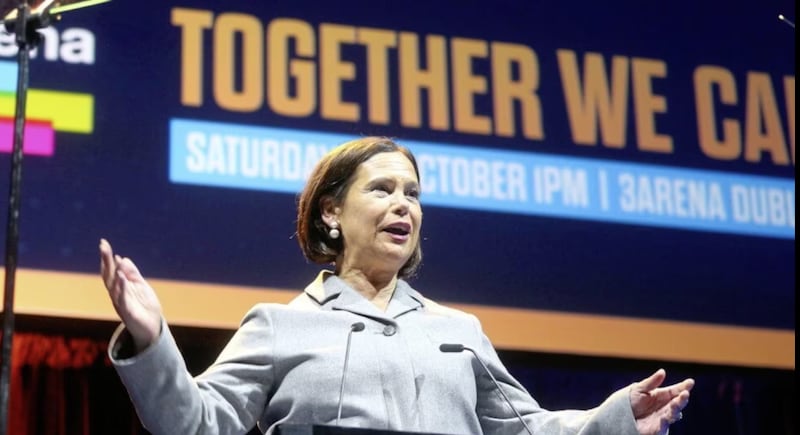“Within touching distance” was one of the phrases used by Mary Lou McDonald last month to talk up the possibility of a united Ireland, as power-sharing returned to Stormont. For accuracy’s sake, how does that translate into a measurable deadline?
On May 19 2022, the Sinn Féin president said in an interview with Sky’s Beth Rigby that “we will see constitutional change in the course probably of the next decade. Of that there is no doubt and we will need to prepare for that”.
The stopwatch was triggered that day. Twenty-one months have passed. On May 19 2032, the accuracy of that prediction can be revisited.

There is another historic first “within touching distance”. That’s the possibility of Sinn Féin forming a government in Dáil Eireann with Mary Lou McDonald as taoiseach. The absolute deadline for that premise to be tested is much closer. In theory a general election can be pushed back until February 2025 but it may be called this autumn.
Despite the slide in support for Sinn Féin recorded in recent opinion polls, the party is on track to retain its status as the most popular party. But in an election, run on a proportional representation basis, there is no chance of Sinn Féin securing a majority of the 174 seats.
It currently has 36 TDs. If Sinn Féin is to turn aspiration into achievement in Dáil Eireann, it will need a partner, or partners.
The two main parties in government, Fianna Fáil and Fine Gael, have done the sums. The ABS (Anyone But Shinners) factor is at play. As polling day nears, it will become a more prominent theme. For Sinn Féin, the nightmare prospect of arriving suited and booted at the altar rails, but with no partner showing up, cannot be discounted.
The two main parties in government, Fianna Fáil and Fine Gael, have done the sums. The ABS (Anyone But Shinners) factor is at play. For Sinn Féin, the nightmare prospect of arriving suited and booted at the altar rails, but with no partner showing up, cannot be discounted
<br/>
Once the votes are counted, pragmatism kicks in. Most politicians want to be in power instead of on the sideline. But the notion of being part of a coalition led by Sinn Féin is a hard swallow. Junior partners often take a kicking at the next election and that reality is also a factor.
Those ruminations in play south of the border provide some context to the experiment underway in Stormont. Michelle Ó Neill is the prototype, testing the theory that Sinn Féin can carry out stable, inclusive, sustainable coalition government. Mary Lou McDonald’s prospects may be linked to how Michelle O’Neill performs.

Michelle wasn’t idle during Stormont’s time in mothballs. Her delivery has slowed. She has developed a presence. Her laugh, including her ability to laugh at herself, made a connection with RTÉ's Late Late Show audience on Friday night. The fact that she was born in Fermoy, Co Cork is another asset.
Martin McGuinness used to smile when Ian Paisley referred to him as “my deputy”. I saw it happen in December 2007 in the White House, when the first and deputy first ministers were in a conversation with President George W Bush. The FM/DFM terms are misleading because it is a joint office.

With the roles now reversed, it was interesting that O’Neill used the “joint office” role when chatting to Late Late Show host Patrick Kielty. Her language and behaviour will be worth monitoring. If it’s about “the north of Ireland” with no mention of “Northern Ireland”, if it’s all about Sinn Féin and brand Michelle, it will linger, in a phrase Albert Reynolds once used, like a fart in a curtain.
But if it’s a Stormont administration built on partnership and inclusion, it will be a different story.

The same principles apply to the DUP and Emma Little-Pengelly. Jeffrey Donaldson has taken the decision, postponed for years, and confronted the malcontents in his own party. To justify that gamble, even though government is always difficult, the DUP has to make a success of power-sharing. And Michelle O’Neill and Emma Little-Pengelly have to be a success as partners.
Not just for themselves but for the sake of Mary Lou, Jeffrey and their parties.
:: Journalist and author Tommie Gorman is a former Northern Editor of RTÉ.



